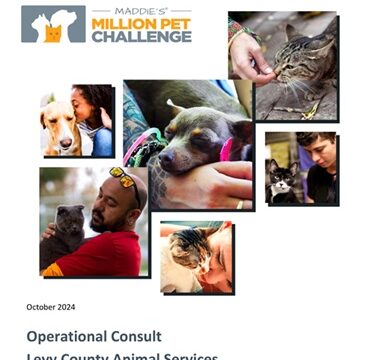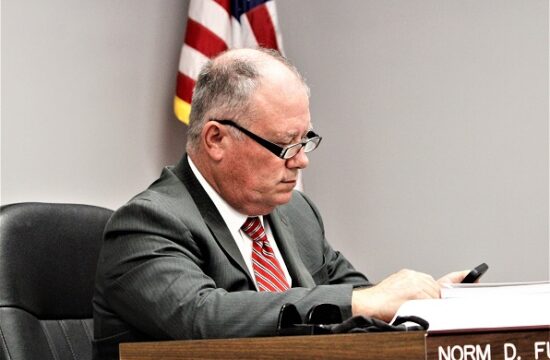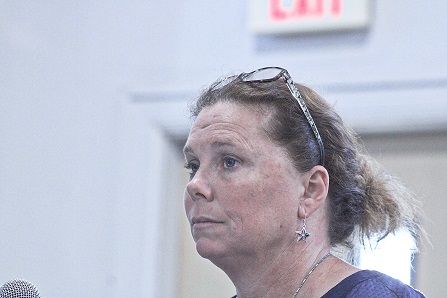Jared Blanton of the clerk’s office, who serves as the county commission budget officer, briefs commissioners about their budget. Jared Blanton of the clerk’s office, who serves as the county commission budget officer, briefs commissioners about their budget.
By Terry Witt – Spotlight Senior Reporter
Levy County Commissioners will go into 2019-20 fiscal year with an operating budget of $89.8 million and a cash reserve of $10.9 million.
Commissioners agreed Tuesday to leave their proposed property tax millage rate at 9 mills rather than adopt the rolled back rate of 8.7725 mills that would wipe out $1.7 million of revenue from economic growth.
The 9 mills is considered a tax increase and would have to be advertised as a rate hike due to the higher amount of revenues from taxable private property in the county.
The board’s budget officer and spending watchdog, Jared Blanton of the clerk’s office, advised against using the rolled back rate, saying it wasn’t enough to keep pace with the rising cost of elected official budgets, health insurance, Florida retirement and wage and fuel increases.
Commissioners will meet at 5:01 p.m. on Sept. 3 to adopt the tentative millage rate and budget. They will meet at 5:01 p.m. on Sept. 10 for a hearing on property special assessments and again on at 5:01 p.m. Sept. 17 to give final approval to the millage and budget.

Commission Chairman John Meeks listens closely to the budget numbers.
The board has come a long way in the past four years from operating with a $4.3 million deficit from overspending to carrying millions of dollars in cash into the next year.
The commission’s upcoming budget begins on Oct. 1, 2019 and ends the following September 30, 2020.
Blanton congratulated the board on moving out of the red ink phase of their financial recovery and into the black ink through sound financial decisions.
For those readers who love numbers, the total amount of property taxes projected for next year is $17.5 million out of an $89.8 million budget. The remaining revenues in the county commission budget come from a variety of sources including grants.
The current budget of $73 million, which ends on Sept. 30, 2019, appears to be $16 million smaller than what is projected for next year, but Blanton said the reason is due in part to a change in accounting procedures plus added grants. He said spending will increase about $1.3 million.
Blanton is recommending against the board purchasing any new ambulances in next year’s budget. He said the Emergency Medical Assessment must be addressed next year, “but ambulance replacement schedules will almost certainly need to be delayed/deferred.”
Blanton said it wouldn’t take much additional spending on ambulances to move the commission out of the black and into the red. The new Ford 550 ambulances cost about $214,000 each. Three of the new ambulances are in next year’s budget for County Public Safety Director Mitch Harrell.
Commissioners recently voted to keep special assessments for Emergency Medical Services, Fire and Landfill at the same rate in next year’s budget.
When the $116 landfill assessment was discussed, questions were raised about how landfill employees distinguish a mixed load of commercial and residential garbage from a load that’s strictly commercial or residential.
County Attorney Anne Bast Brown said the landfill makes an effort to audit loads to make sure commercial isn’t mixed with residential but she wasn’t clear how landfill officials distinguish between the two.
After the meeting, Landfill Administrative Supervisor Rod Hastings said garbage trucks with front end loaders are considered commercial and those that load from the back are residential.
Residential garbage dumping by individuals and commercial companies is free at the landfill under a new system implemented by commissioners in the fall of 2018.
Hastings said the county is in the process of requiring commercial haulers to fill out licensing applications. The licenses will force companies to carry liability insurance and operate numbered trucks that can be identified at the landfill. He said they hope to have all those applications completed and on file by Oct. 1.
He laughed when asked if there is any cheating taking place at this time.
“Right now we don’t have much teeth in our bite, but we will have more when we enforce the licensing,” he said.
Hastings said non-commercials cars and trucks entering the landfill with garbage are assumed to be residential unless the county knows it is a mixed load at which time they are charged extra.
For now, the landfill distinguishes between non-commercial garbage loads and commercial garbage loads by looking at whether the truck has a front end or rear end loading system.
When the new licensing ordinance is in place in October, commercial haulers will also be required to have coverings over the loads to prevent garbage from blowing into ditches.
—-
Levy Board of County Commission Budget Workshop July 30, 2019; Posted July 30, 2019













